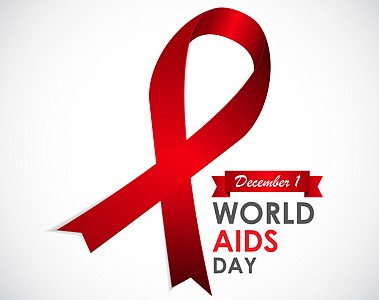Nearly 40 years after the first diagnosis of AIDS in the United States, which was later found to be caused by HIV, HIV and AIDS remain misunderstood. But two facts remain certain— the best way to stop the spread of HIV and prevent progression to AIDS is for everyone to be tested, and for those living with HIV to take HIV medications.
December 1 is World AIDS Day, and the University of Maryland Medical Center Midtown Campus— along with partners the THRIVE program and JACQUES Initiative of the Institute of Human Virology— will host the Red Ribbon Route on December 2, 2019.
The Red Ribbon Route is an opportunity for the community to get free HIV testing, education, prevention tips, and connection to HIV care, at three locations in Baltimore City.
Look for the UMMC Community Education van with the red ribbon at these locations:
—30 West North Avenue
10 a.m. – 2 p.m.
—Community Health Education
Center, University of Maryland Medical Center Midtown Campus, Linden
Avenue 10 a.m.- 3 p.m.
—JACQUES Initiative Journey
Center, 880 Park Avenue, Suite 300
10 a.m. – 3 p.m.
If you are living with HIV and are not currently in care, ask for the ‘Red Carpet’ treatment at any of the screening locations, to get re-connected to care. Insurance is not required for this event, and results are completely confidential.
HIV (human immunodeficiency virus) is a virus that attacks the body’s ability to fight infection, making a person more vulnerable to other infections and illnesses. It is spread by contact with certain body fluids of a person with HIV, most commonly during unprotected sex (sex without a condom), or through sharing supplies for injection drug use. It cannot be spread by kissing, hugging or touching.
AIDS is the late stage of untreated HIV infection that occurs when the body’s immune system is badly damaged by HIV. If people are tested routinely, and HIV infection is diagnosed and treated early in the disease process, AIDS will not develop. If AIDS does develop, it can still be treated so that people’s immune system can become strong again.
The human body can’t get rid of HIV and no effective HIV cure exists. So, once you have HIV, you have it for life. However, by taking HIV medicine as prescribed, people living with HIV can live long and healthy lives.
For people who did not have HIV but are at higher than average risk, there are also effective methods to prevent them from getting HIV through sex or drug use, including PrEP (pre-exposure prophylaxis) and PEP (post-exposure prophylaxis). PrEP is a way for people who are HIV negative but at high risk to prevent HIV infection, by taking an HIV pill every day. PEP means taking HIV medication to prevent HIV infection very soon after being exposed to HIV. Learn more at PrEPMaryland.org.
How Do I Know If I Have HIV?
Most people with HIV will not have any symptoms! The only way to know for sure if you have HIV is to get tested. And testing is simple. You can ask your health care provider for an HIV test, or get tested for free at multiple locations throughout the city.
Sarah Schmalzle, MD is Assistant Professor of Medicine, Division of Infectious Diseases and Associate Program Director, Infectious Disease Fellowship, University of Maryland School of Medicine; and, Medical Director, THRIVE program of the Institute of Human Virology at the University Of Maryland Medical Center Midtown Campus.
